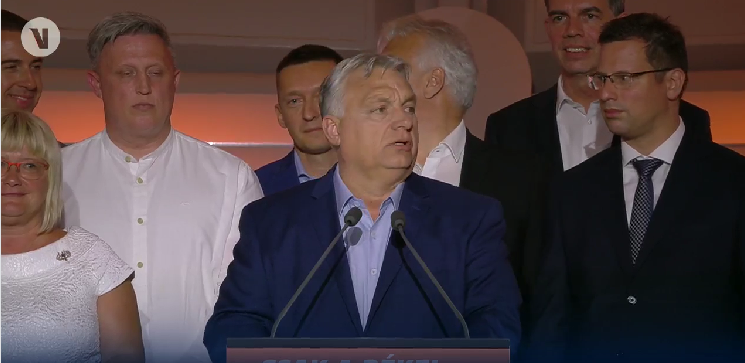Change language:
Election recap: Péter Magyar’s party wins big, Karácsony remains but may have problems in the Assembly

Sunday’s municipal and EP elections in Hungary saw a record-high turnout of 58 percent. It was also a historic event as never before have European and local elections been held on the same day in the country. Fidesz came out as the absolute winner, but the Tisza Party has entered the political arena, reshuffling the balance of power amongst the opposition. Here is a round-up of the takeaways from the elections.
In Budapest, a few hundred ballots made the difference: a recount could be on the table
After an all-night tight race, Gergely Karácsony, the candidate of DK-MSZP-Dialogue and Momentum, won the mayoral election, despite his challenger, Dávid Vitézy, leading for the majority of the evening. Karácsony won by a margin of only 324 votes and the number of invalid votes was relatively high. Therefore, as reported by DNH, Vitézy called for a recount of the ballots.
Although several press outlets have underlined that a recount may be carried out under Hungarian law only if a specific violation is reported – a small margin is therefore not in itself a reason for a recount -, Péter Ungár of LMP also spoke of a recount today in the Parliament, according to 444.
As we wrote today, Vitézy calls for a recount, details HERE.

The General Assembly of Budapest might see trouble in the future
Another precarious situation regarding the capital stems from the makeup of its Assembly, in which the number of representatives will be distributed this autumn as follows:
- Fidesz-KDNP: 10
- Tisza Party: 10
- Dialogue-DK-MSZP: 7
- Hungarian Two-Tailed Dog Party: 3
- Dávid Vitézy for Budapest-LMP-Greens: 3
Péter Magyar and Dávid Vitézy (if the number of votes for mayor does not change) have also been elected to the Assembly.
In such a diverse formation, it will be a matter of uncertainty about what kind of coalition the next mayor can build, as no political force will be able to govern independently. To get a majority, at least 17 politicians will need to join forces, and at the moment this could be done in several ways, all of which would require a great deal of tactical maneuvering.
444 points out that the situation is complicated by the fact that Péter Magyar does not wish to formally cooperate with any of the mayoral candidates. For Karácsony – who presumably will not enter into a coalition with Fidesz -, on the other hand, the 10 Tisza Party representatives would be indispensable allies. In the case of Vitézy, cooperation with Fidesz might be conceivable, but for Fidesz-KDNP, a partnership with opposition parties is likely out of the question, meaning that reaching the magic number of 17 could be difficult for him, as well.

The great loser of the local elections is Momentum, which, although securing three mayoral positions in Budapest, cannot send a single member to the capital’s assembly. Largely due to the reform of the electoral system in Budapest, adopted by the Fidesz parliamentary majority six months before the elections, which made it so that mayors are no longer automatically members of the assembly.
On Monday, Anna Donáth announced that she would step down as Momentum’s leader following the defeat of the party.
The country is coloured orange, but Fidesz saw setbacks everywhere
Political analyst Gábor Török wrote that the municipal election results are very similar to those of 2019, even if a few cities have changed hands. By and large, Sunday was a success for Fidesz, but the picture is not so simple. As Telex reports, more than 20 municipalities have replaced Fidesz mayors, many ousted after being in power for decades.
In Orosháza, the candidate of the opposition coalition won against Fidesz’s Zoltán Dávid after ten years. The independent candidate from Tököl, Zoltán Tóth, broke an even longer Fidesz reign: after 35 years in office, Pál Hoffman did not run this year, and Lucia Vass, the Fidesz candidate who was set to replace him, was defeated by Tóth.
The opposition also scored successes in Balatonalmádi, Paks, Biatorbágy, Tolna, Szolnok, Pápa, and, perhaps as one of its most notable results, in Győr.
On the other hand, as Népszava writes, Fidesz-backed politicians were able to turn the tide in Baja, Miskolc, Salgótarján, and Eger, and the mayors of Békéscsaba, Debrecen, Esztergom, Sopron, Székesfehárvár, Veszprém, Kecskemét and Zalaegerszeg, among others, supported by Fidesz, won with solid leads.

Photo: Viktor Orbán / PrtSc from Facebook
The county assembly elections show a somewhat declining Fidesz dominance: although the party won all 19 counties, it showed proportionally worse results than five years previous, Telex also reports.
In the European Parliament elections, Fidesz-KDNP won 11 seats with 44.72 percent of the vote, down 7.5 percentage points from 2019, when they secured almost 52 percent of the popular vote.
Reflecting on Sunday overall, Gábor Török highlighted that “Fidesz has not achieved such a poor result in national elections since 2006, while a ‘non-Fidesz’ party running alone has not done so well since 2006.”
“A new situation has emerged, which will certainly lead, encourage, or force political actors in new directions.”
Péter Magyar and the Tisza Party take the election by storm
One of the biggest winners of the elections was undoubtedly the Tisza Party led by Péter Magyar, which achieved 29.63% in the EP elections (thus gaining 7 seats) and, as seen above, will also be a dominant force in the Budapest Assembly. Based on Sunday’s vote, the party can claim to be the second-strongest player in Hungarian politics, after less than three months of operation.

Curiously, at the moment, Magyar’s campaign is as much – and possibly more so for the time being – of a threat to the opposition as it is to Fidesz. Indeed, Telex even titled its analysis of events:
“Péter Magyar has replaced the opposition in three months.”
“One of the big questions of this election,” the site writes, “was whether the Tisza would really succeed in destroying the old opposition and the system of central power. The answer is pretty clear: it has succeeded and it has destroyed it.”
Tisza soundly trounced DK, the other opposition ‘big’, and it seems that the party may be able to break out of the traditional (in the last few years) opposition positions, where many small parties are trying to form coalitions, often on the sole basis of being against Fidesz.
In the long term, this could have a considerable impact on the 2026 elections: if the Tisza Party is able to maintain its dynamism and offer a viable alternative to Fidesz, it could pose a threat to the governing parties. In any case, it is noteworthy, from the point of view of both Fidesz and the opposition, that Tisza has built a party with almost 30% support in a very short time and with a minimal organisational background.
To summarise, Gábor Török writes:
“Both Fidesz and the pre-2024 opposition will have to contend with the challenge posed by Tisza in the period up to 2026, while Tisza can continue to build as the strongest opposition party – almost in the same league as Fidesz.”
Read also:







